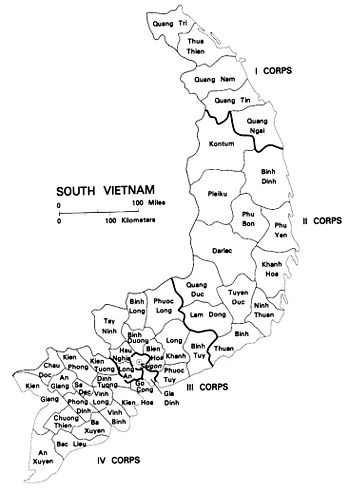II Corps tactical zone: Difference between revisions
Jump to navigation
Jump to search

imported>Howard C. Berkowitz No edit summary |
imported>Howard C. Berkowitz No edit summary |
||
| Line 24: | Line 24: | ||
| Hau Bon | | Hau Bon | ||
| [[Gia Lai Province]] | | [[Gia Lai Province]] | ||
|- | |- | ||
| [[Dac Lac Province]] | | [[Dac Lac Province]] | ||
Revision as of 20:07, 19 December 2008
During the Vietnam War, the Army of the Republic of Viet Nam (ARVN) defined II Corps tactical zone (II CTZ)[1] as central Vietnam, including both the lowlands and the Central Highlands. It covered nearly half the land area of South Vietnam.
Provinces in II CTZ| 1965 name | 1965 Capital | Current name |
|---|---|---|
| Quang Ngai[2] | Quang Ngai | Quang Ngai Province |
| Kontum | Kontum | Kontum Province |
| Binh Dinh Province | Qui Nhon | Binh Dinh Province |
| Phu Bon | Hau Bon | Gia Lai Province |
| Dac Lac Province | Ban Met Thuot | Dar Lac Province (also Dar Lac) |
| Khanh Hoa | Nha Trang | Khanh Hoa |
| Quang Duc Province | Nghia | Dac Lac Province |
| Phu Yen Province | Tuy Hoa | Phu Yen |
| Tuyen Duc Province | Da Lat | Lam Duc |
North Vietnamese equivalents
U.S. equivalents
Conventional American forces in II CTZ were under I Field Force Vietnam, headquartered at Nha Trang. 5th Special Forces Group headquarters were also in Nha Trang
References
- ↑ Corps is usually a tactical, rather than geographical structure; the U.S. renamed its Vietnam War corps formation s "field forces" to avoid confusion. In July 1970, the Republic of Vietnam redesignated its CTZs as Military Regions (MR). ARVN MR numbers, however, had no relationship to the People's Army of Viet Nam's MR numbering scheme.
- ↑ Also in I CTZ
